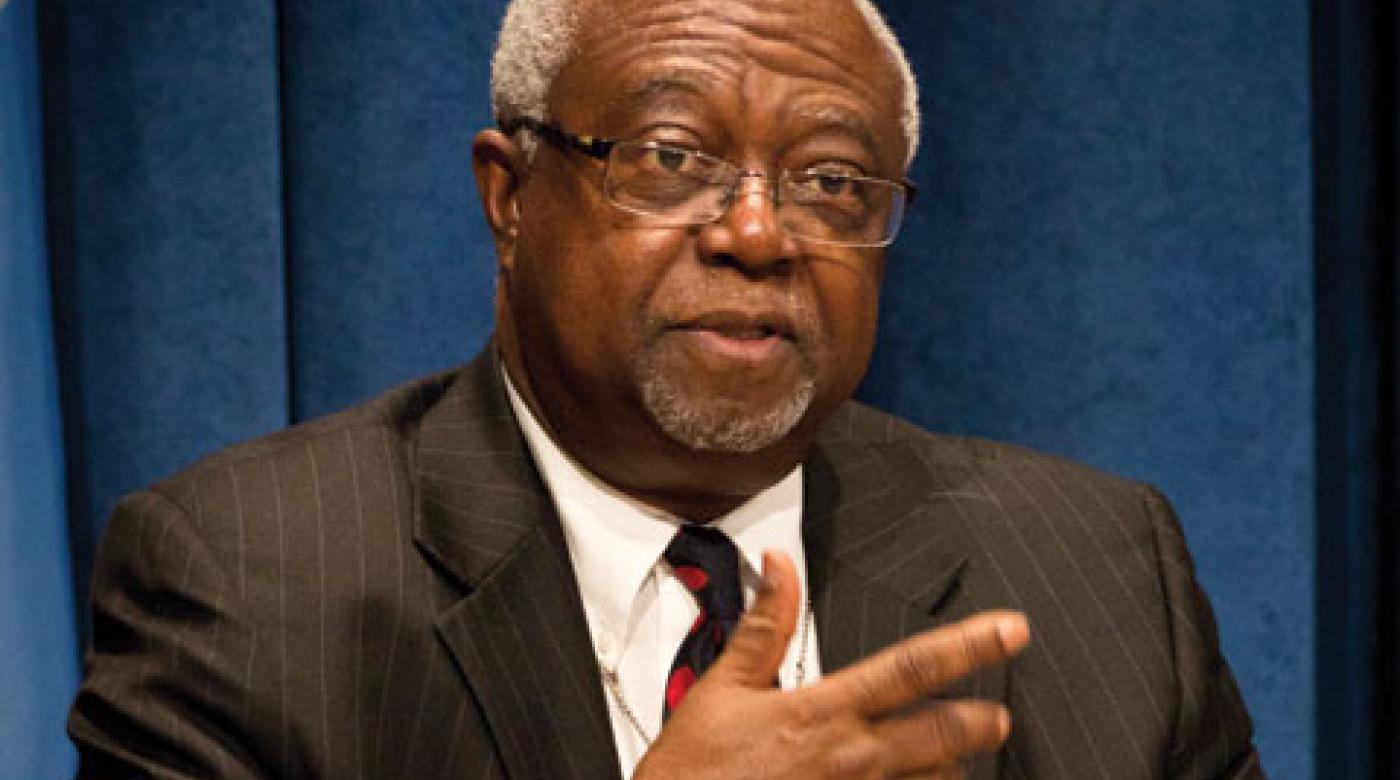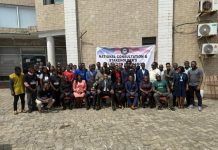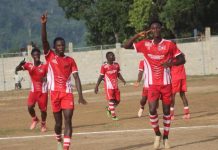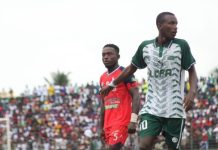Africa-Press – Liberia. Like the best of us, Dr. Sawyer had his imperfections. For example, some of his critics and those of ex-president Ellen Johnson Sirleaf view the two as “cunning and manipulative” politicians very adept at using someone else’s hand to take their chestnut out of the fire.
Be that as it may, no one would claim to have found Dr. Sawyer wanting when it came to taking courageous actions and stances on his own in the greater interest of society, as he did when he stood toe-to-toe with the military leader in the 1980s, and when he left his research and teaching job at Indiana University to lead fellow Liberians in the political and diplomatic struggle to ensure that the leadership of Liberia is never ever again determined by sheer force of arms—with all the dangers and inconveniences that such a leadership would involve.
As relaxed and unfazed Dr. sawyer often was over criticisms levied against him personally, and the IGNU generally, he was however less so when it came to the following particular allegations that were without merit:
1.That he stopped the no-nonsense ECOMOG Field Commander, Lieutenant-General Joshua Nimyel Dongonyaro (deceased on May 2021 in Nigeria at age 80) from further pursuing Taylor and his NPFL forces to the end of the earth after ECOMOG had succeeded in dislodging NPFL forces from the outskirts of Monrovia to make space for the seating of the IGNU.
2.That he and his IGNU were trying to steal the thunder of Charles Taylor who had risked everything and contributed immensely to militarily remove Samuel Doe, but was not being given the chance to take over the reins of government.
3.That the IGNU deliberately prolonged its tenure in order to cling to power.
4.That he needlessly changed the Liberian currency and so distorted the economy.
5.That Dr. sawyer turned a blind eye to alleged corruption on the part of his officials in exchange for maintaining the unity of the patchwork that was the IGNU, including allowing his officials to go away with government owned cars after the dissolution of the IGNU.
To attempt to explain away each of these points in any depth will stretch this write-up far beyond its intended scope. However, even though the IGNU made some efforts to respond to these queries during and immediately after its existence, the passing of the IGNU leader perhaps provides yet another opportunity and forum to briefly set the record straight regarding these controversial aspects of the war-time transitional regime based on what I know, rather on any desire to offer excuses. Arm-twisting
On the issue of Dr. Sawyer restraining General Dongonyaro from outrightly defeating Taylor in the early days of the regional intervention force, the truth is that the pause by the General had less to do with Sawyer than it had to do with (1) the will and desire of regional leaders to maintain cohesion and unity among troop-contributing countries, and (2) hysteria generated by self-serving prominent Liberians in exile then who were vested in Charles Taylor’s insurrection, in the naïve expectation that once Taylor emerged victorious, he would turn over power to them.
These anti-Doe and pro-Taylor Liberian exiles used their connections with certain regional leaders, including Ghanaian President Jerry John Rawlings, to halt the advance of Dongonyaro’s troops on NPFL-controlled territory. They spun a web of diabolical lies against Dongonyaro whom they accused of having morphed into a loose cannon, and using jet fighters to indiscriminately bomb civilian locations, killing children and women in the process.
Unfortunately, as imaginary as these allegations sounded, they nevertheless gained so much traction that the Ghanaian leader, summoned the then Banjul-based IGNU leadership to Accra. On our arrival, Rawlings got his then Deputy Foreign Secretary, Mohamed Ibn Chambas (who, at this writing, is Head of the United Nations Office for West Africa), to convene a hastily arranged and choreographed media event at which Dr. Sawyer was virtually arm-twisted into calling on the Nigerian ECOMOG commander to halt his offensive—now that he had succeeded in pushing Taylor’s forces from the outskirts of Monrovia.
The press conference was so tightly teleguided form the Jubilee House (President Rawling’s office) that it went according to Rawlings’ script. Dr. Sawyer had no more than five minutes to issue the statement, after which Chambas declared the so-called press conference over—with no questions asked by reporters present. It had served the purpose of the tempestuous Rawlings, who had threatened to withdraw his Ghanaian contingent from ECOMOG if Dongonyaro was not brought to heel.
That was one rare occasion when I saw Dr. Sawyer deflated, and I felt very sorry for the unenviable situation he had found himself. At that critical point in the peace-keeping efforts, the last thing the IGNU and pro-IGNU regional leaders wanted was a rift among troop-contributing countries, especially that which would pit the two most militarily powerful troop contributing countries making up ECOMOG—Ghana and Nigeria—against each other. Surely, disunity among contributing countries would have weakened the internationally-backed regional effort to end the conflict, with the potential of losing even more lives and displacing hundreds of thousands more.
Regarding the claptrap disinformation claim that NPFL and its supporters kept peddling domestically and externally to the effect that politicians like Sawyer and Baccus Mathews wanted to ride on the coattail of Charles Taylor’s military success to cleverly gain power for themselves, nothing could have been further from the truth.
As far as I knew, no one was out to steal Taylor’s thunder, but that did not mean there were no adherents to this line of thinking. For example, I remember meeting in Washington, D.C., with some elderly and well-established Liberians who had all relocated to the United States in the wake of the civil conflict. They had taken the opportunity of my presence in the United States a few months after Octopus, to invite me to brief them on progress, if any, in the peace process.
As I looked around the room it became clear to me at the outset that most of those gathered in there were Taylor’s supporters. And sure enough, following my briefing, question after question revolved around the need to pacify Taylor, rather than calling him to order for refusing to disarm, and for continuing to wage war on the peacekeepers who had been sent to the country for no other purpose but to save Liberians from themselves.
They kept asking why Sawyer and INGU were not endeavoring to shorten the war by giving Taylor the chance to lead the country for, “at least, a few years.” After all, they noted, he had the strongest military muscle among the warring groups. This argument predictably turned out to be at the core of the ‘peace plan’ they put before me at the meeting to take to Dr. Sawyer for consideration. I told them that with due respect to them, that suggestion was a non-starter and was dead in the water—not only from the perspective of the political parties, interest groups and other warring factions, but also from that of the regional body that was shepherding the peace process. If Taylor wanted the presidency, I argued, he only needed to have his fighters disarmed along with those of all other factions, so that a level-playing field would be established for the holding of truly free and fair elections.
I predicted that their ‘peace plan’ of pacification, anchored as it were, in illogicality, would be a recipe for further disaster and militarization of the country even after Taylor had used his big gun to ascend to power. I assured them that if Taylor were rewarded with the presidency because he had a big gun, that would not guarantee that some other individual or group of persons with a bigger gun than that of Taylor, may not, in the fullness of time, be tempted to wrest power from Taylor too. (We all saw what happened later when LURD, with a bigger gun, courtesy of the late President Lansana Conte of neighboring Guinea, contributed immensely to sending Taylor into exile—and then ultimately to where he is now languishing).
I reminded them that before Taylor started his insurgency, Samuel Doe had seen himself as a colossus with an arrogant confidence in his invincibility—only for his army to crumble in a few months in the face of a rag tag rebel group that was both outgunned and outmanned by Doe’s state-sponsored forces. Holding free and fair democratic elections, I concluded, was the only long-term solution for peace in Liberia– rather than accepting military strength as the pathway to the leadership of the country. Elephant in the Room
Yes, ultimately, Taylor agreed to elections, but for many it was an election process that didn’t pass muster in regard to establishing a truly level-playing field, as Taylor never cooperated with ECOMOG to fully disarm. Elections are not just about casting votes. The exercise is a process all by itself, and so if one key element, like ensuring a level playing field, is absent or truncated, then the process cannot be deemed democratic and or legitimate. Was it surprising therefore that despite the so-called elections in 1997, the conflict never ended, with Taylor, just over half way in his first term, confronted and dislodged by other armed groups who refused to acknowledge that the election that brought Taylor to power was free and fair and therefore legitimate?
As to the criticism that Sawyer’s IGNU prolonged its tenure on purpose and by design, the accusation has no iota of truth. I recall how all the planning we did in Banjul, and all assignments and activities that we plotted and mapped out for the Monrovia return, were time-lined for no more than six months.
As it turned out, this six-month planning scenario proved wildly unrealistic primarily because we did not factor into the planning process the elephant in the room—Charles Taylor. We took for granted that once Taylor’s nemesis (Samuel Doe) was no longer in the equation, and once he was offered a major seat at the table, minus the leadership of the IGNU, Taylor would lay down his arms and cooperate with the process leading to free and fair elections in six months. Taylor insisted to anyone who cared to listen, that by virtue of the fact that he had initiated the successful struggle to dislodge Doe, and had come within a striking distance of gaining the Executive Mansion, only he could lead the emerging government—otherwise he will not disarm his fighters and the war will continue, with even more ferocity.
That line of thinking was total unacceptable not only to political parties and civil society groups, but also to the international community. Evidently, Taylor’s stance subsequently led to a prolonged stalemate and therefore kept the IGNU in situ. And so as long as NPFL refused to disarm, and instead continued its armed campaign despite perpetual attempts by regional and international peace efforts, the longer the lifespan of the IGNU would be.
I know for a fact, that many a time during our conversations, Dr. Sawyer would lament over how much he missed walking down the streets like any ordinary citizen or resident would do, and exercise the liberty of having a cold beer against the backdrop of a song by one of his favorite artists, Whitney Houston. I know for a fact also that, on a couple of occasions, Dr. Sawyer made it clear to some ECOWAS leaders that if Taylor wanted someone else, other than himself (Sawyer), as head of the IGNU, and that as long as that new IGNU head will not be Taylor also, and if such a change in the leadership of the transitional government will get Taylor to disarm and allow for free and fair elections, he (Sawyer) was 100% prepared to stepdown under such arrangement.
As for many other IGNU functionaries, there was nothing particularly glamorous or materially rewarding in being a government official in a war time government. For one thing the IGNU was severely cash-strapped, in contrast to the NPFL which, for the duration of the war, controlled 80% of the resources of the country. (Recall the huge volume of logging trade NPFL was conducting through the Ports of San Pedro in La Cote D’Ivoire and Buchanan, some 95 kilometers away from Monrovia, and you would know exactly who had more incentives to prolong the conflict).
For another, it was not fun for many IGNU officials to cope with the constant threats from the NPFL, as well as from trigger-happy Prince Y. Johnson. While Taylor threatened to push the IGNU into the sea one of those days, PYJ, at the other end, repeatedly warned that he would attack Ducor at any time to get rid of the IGNU—a threat that was merely an exercise in braggadocio—given the presence of a menacing ECOMOG tank stationed at the entrance of the Caldwell bridge leading to his base.
And by the way whoever wanted to be having sleepless nights worrying about how to keep a teeming Monrovia population afloat, and risking flying all over the subregion mostly in Cessna planes that on some trips almost came down with us! During one such turbulence experience in the air, I remember Dr. Sawyer turning toward me and wondering how long we were going to remain lucky in taking such risky air flights, all because of our determination to search for the ever-elusive peace.
Furthermore, our accommodation situation at Ducor was such that very few IGNU officials, given the option, were willing to continue living in a congested and decrepit Ducor building for three consecutive years, with no running water, and sleeping on beds that were meant more for billets in a war zone than for any comfortable sleeping purposes. ECOMOG had intentionally selected Ducor (topographically the highest point above sea level in Monrovia) as the seat of the IGNU in order to be able to robustly defend it if and whenever it came under attack from any force.
Meanwhile, Taylor and his group were in no hurry to leave their Gbarnga-based settlement, as they could leverage the corridor of tranquility that ECOMOG had created (to facilitate contacts and confidence-building between Liberians ‘behind the line’ and those in IGNU-controlled areas), to visit Monrovia for shopping and meet relatives and friends, while compatriots in Monrovia couldn’t venture in their area of control. Bank Notes & Happy Knowledge
In fact, at some point during the peace process, Dr. Sawyer, as head of the government, and myself, as Minister of Information, made the conscious and intentional policy decision, in collaboration with ECOMOG, to allow the NPFL to publish its Patriot newspaper at the Sabanoh printing press on Broad Street without any interference or intimidation—to the chagrin of many residents. They continued printing their opposition paper in Monrovia until their subversive intent became clear as evident by the ‘Octopus’ operation.
The criticism that Sawyer, and by extension, the IGNU, arbitrarily changed the “J.J. Roberts” Banknotes in circulation at the time was borne out of ignorance of the political and economic dynamics prevailing at the time, and the disposition of a gullible segment of the population to swallow hook, line and sinker the deliberate lies PYJ peddled against Sawyer and the IGNU on the currency issue.
Finance Minister, Samuel Tweh, in his tribute to Dr. Sawyer, has attempted to briefly explain the economic exigencies that underpinned the change in currency under the IGNU. His analysis is definitely on point, even though he tried to put a diplomatic gloss on the looting of “JJ Roberts” notes that took place when warring factions entered Monrovia. Prince Johnson in particular had looted Millions of Liberian dollar notes from banks located in his area of control, and these had been carted away and stored in several containers on PYJ’s Caldwell base—at Taylor Major’s compound. That became a drag on the small economy under the IGNU. So, there was both a moral as well economic reason for effecting the currency change.
It was this sudden turn in PYJ’s financial fortunes that made him bitter against Sawyer and the IGNU and that led him to renounce his association with the IGNU and accuse Sawyer falsely of corruption. PYJ never forgave sawyer for pulling that fast fiscal strategy on him. The story goes that because the time given to change the old Liberian currency had been deliberately shortened to lessen the capacity of PYJ to easily convert his stolen Liberian dollars stocked in containers at Caldwell, a large amount of his old currency booty was rendered useless. Prince Johnson was so enraged by the introduction of the new Liberia dollar notes that he reportedly executed two of his men for being in possession of five-dollar notes in the new currency.
Perhaps the most ridiculous of all charges levied against Sawyer and the IGNU was that the interim president allowed his government officials to take away vehicles that were assigned to them while the interim government existed. The first question in this regard should be how many government vehicles the IGNU acquired from the Doe regime? By the time the IGNU set up shop in Monrovia, 99% of all government vehicles had been appropriated by Doe’s officials, and many had been taken across the borders to Guinea Conakry, La Cote D’Ivoire, and Sierra Leone by fleeing government officials who ended up selling them in their host countries in order to survive.
The few that were found at the post-Doe Executive Mansion grounds were either in a state of disrepair or had been rendered completely inoperable. As far as I know, minus one or two bulletproof Mercedes Benzes and no more than a dozen other ordinary vehicles that needed extensive repairs, there was nothing much to inherit from the previous government in terms of so-called government vehicles. I have been told those two Benzes were preserved for the subsequent interim leaders that succeeded Dr. Sawyer.
In this circumstance, only a very few IGNU officials had access to the few government vehicles that had been salvaged from the large fleet of vehicles the Doe regime had at its disposal. I, for one, used my private car for much of the duration of the IGNU. Thankfully, before fleeing Liberia on the last helicopter leaving the besieged capital during the heat of the war, I had left my vehicle in the care of a U.S. embassy personnel (who was my friend) who made sure it was relatively safe, first at his residence, and then at the U.S.-operated Graystone facility up at Mamba Point, where I recovered it virtually intact upon my return to work with the IGNU.
The only cheap, used small car that was bought for my Ministry a year and a half years after the IGNU had landed in Monrovia, was damaged beyond repairs in an accident caused by the driver at the intersection of Broad and Lynch streets, less than a month after it had been acquired. I also came to know that the handful of vehicles that critics say was taken away by former IGNU officials had, in the majority of cases, been repaired at personal expense by the individuals who had them. I don’t have all the facts, but subsequently, I found out that those few IGNU officials entered into some agreement with the General Services Agency (GSA) under the leadership of the very affable Willard G. Russell (deceased in 2020).
It’s one thing to criticize, but it’s a different thing to do so without the facts. The IGNU found itself in a situation where the country had virtually ceased as a nation. With virtually no resources at its disposal, and confined to a little enclave of the country, with a teeming war-weary and hungry population to fend for, the IGNU was clearly overwhelmed by the challenges that confronted it. How many Liberians know, for example, that up to one year into its existence, much of IGNU’s operations were largely financed by resources made available by individuals. In contrast. Taylor and his NPFL officials were mercilessly selling the country’s national resources which were under their control. And yet, the NPFL or its leadership attracted little if any condemnation for this.
No one is trying to make excuses for the imperfections of Dr. Sawyer and the transitional government that was set up to last for no more than six months. And no one is claiming either that the IGNU was perfect in all its operations. But when considered against the very harsh conditions that greeted the IGNU in Monrovia and its environs, and the multifarious challenges it faced in a war-ravaged environment with few resources to deal with these, it becomes a bit unfair to have expected perfection from its leadership and its officials–many of whom sacrificed so much just so the country could be put on an even keel after all hope had been lost for its survival as a polity.
All in all, Dr. Sawyer and his team did what they could in the true spirit of patriotism, and at a time when very few Liberians thought the country would again get on its feet. The learned professor must have gone to the great beyond in the happy knowledge that he and his small team of dedicated individuals rallied to the cause of saving Liberia from its worst demons of war and self-destruction, at a time when all seemed to have been lost. May his gentle soul REST IN PERPETUAL PEACE.
For More News And Analysis About Liberia Follow Africa-Press






